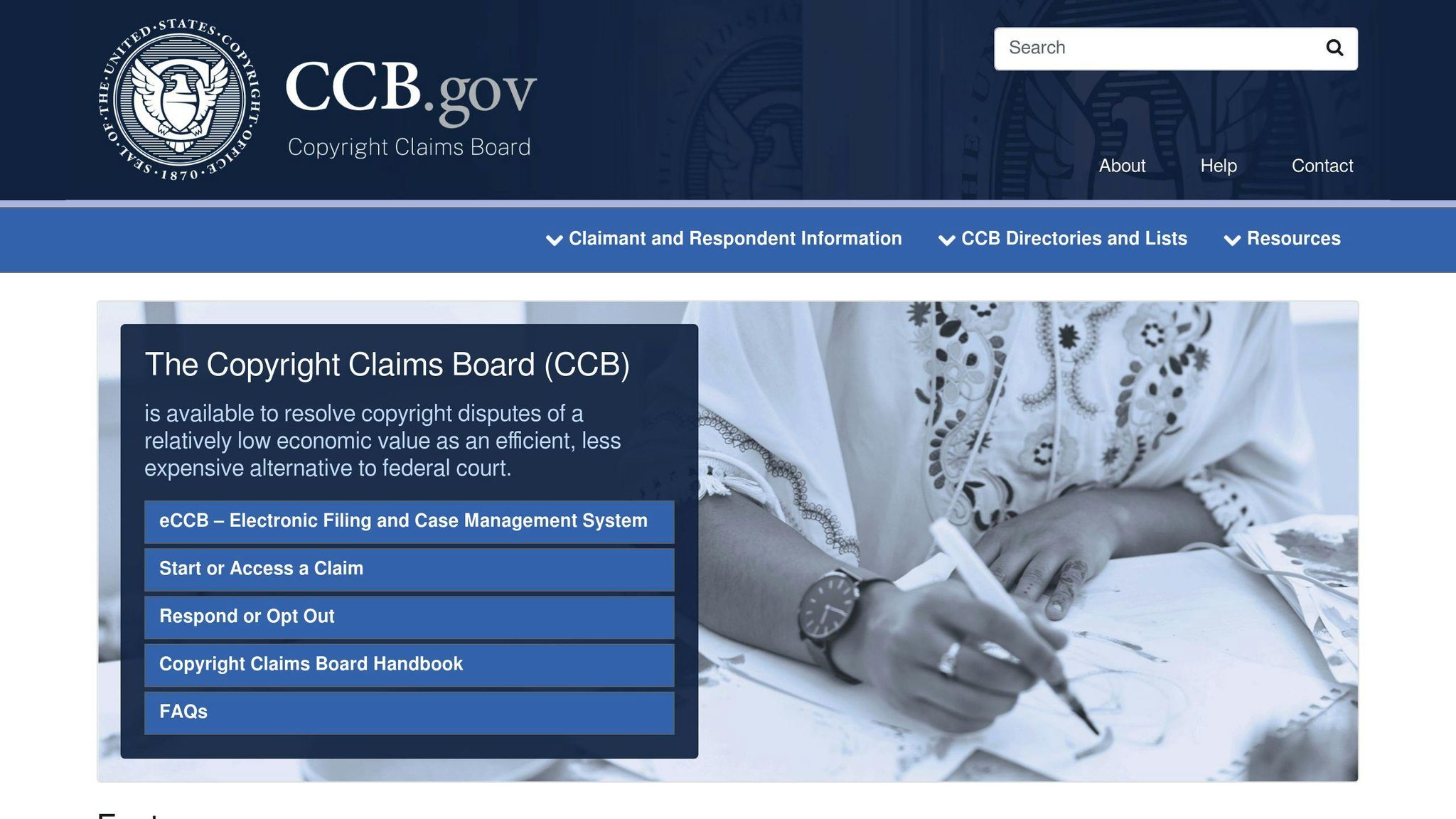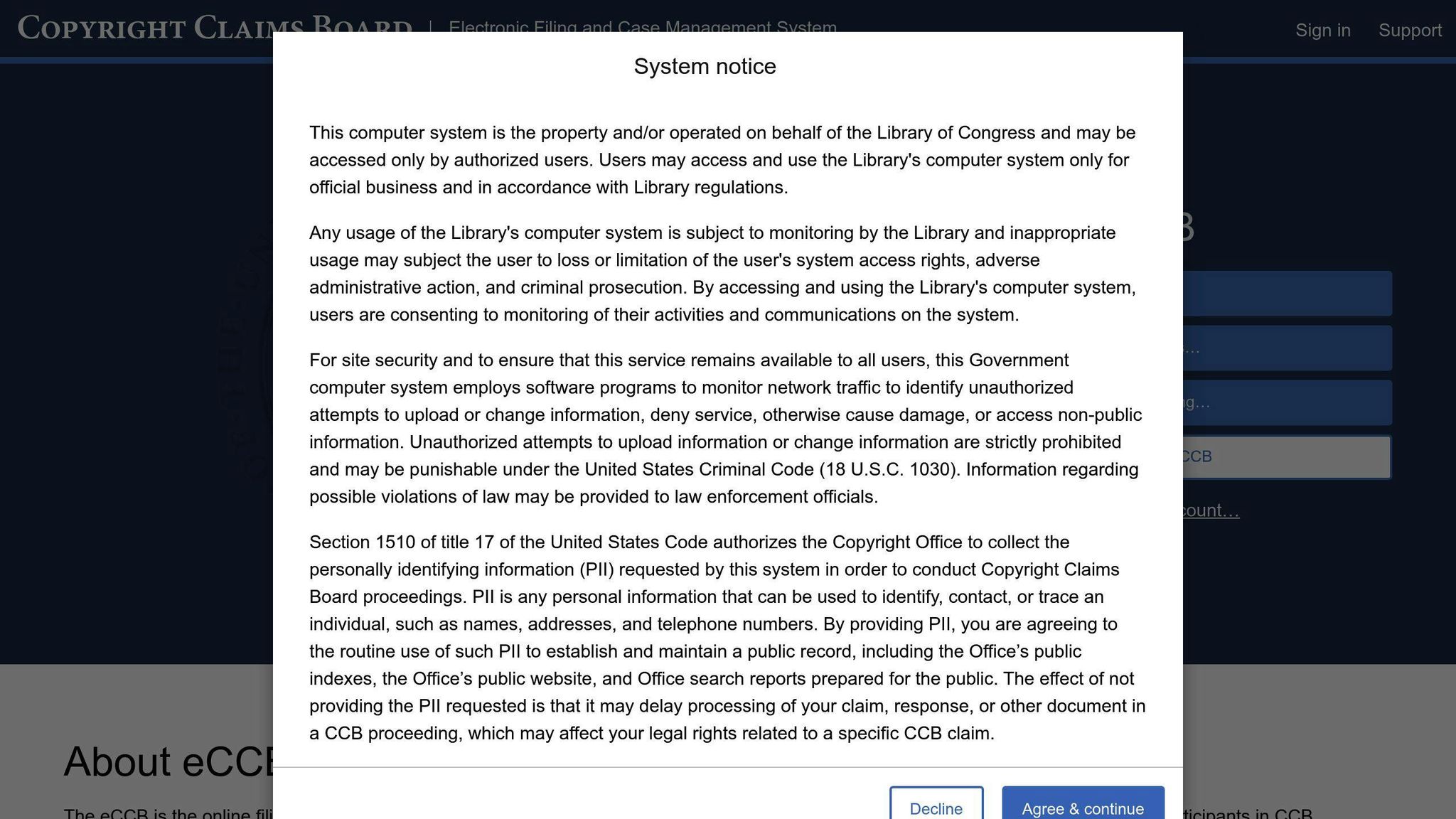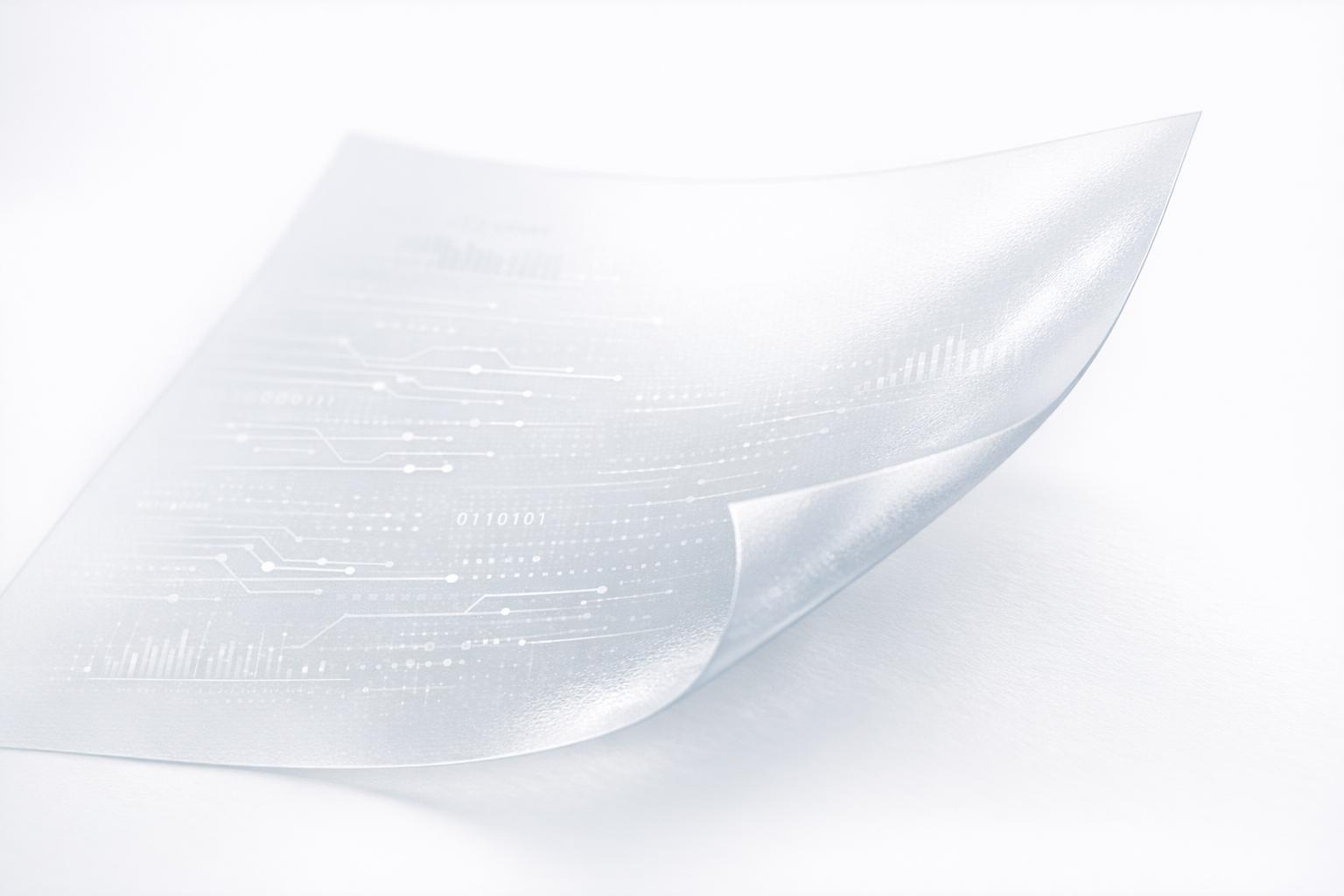The Copyright Claims Board (CCB) is a voluntary and affordable alternative to federal court for resolving small copyright claims up to $30,000. It was established by the Copyright Alternative in Small-Claims Enforcement Act of 2020 (CASE Act) to provide an efficient and cost-effective way for creators and businesses to address copyright issues.
Related video from YouTube
Key Features
- Voluntary: Participation is not mandatory
- Affordable: Lower costs compared to federal court litigation
- Streamlined: Efficient process for resolving small copyright claims
- Remote Proceedings: No need to travel for hearings or meetings
- Limited Jurisdiction: Handles specific copyright-related claims up to $30,000
The CCB handles claims related to:
- Copyright infringement
- Declarations of non-infringement
- Misrepresentation claims related to DMCA takedown notices
Filing a Claim
To file a claim with the CCB, you’ll need:
| Document | Description |
|---|---|
| Copy of the copyrighted work | E.g., book, song, image |
| Evidence of infringement | Proof of infringement |
| Completed claim form | Form provided by the eCCB system |
| Filing fee payment | $100 fee (split into $40 and $60) |
Responding to a Notice
If you receive a copyright infringement notice from the CCB:
- Review the notice and gather relevant information/documentation
- Consult a copyright attorney to assess the claim’s validity
- Decide whether to opt out of the CCB process or proceed
CCB Proceeding Process
The CCB proceeding process typically takes several months and involves:
- Filing and service of the claim
- Initial and merits conferences
- Discovery and evidence exchange
- CCB decision and potential appeals
Settlements and Damages
- Parties can negotiate settlements through the CCB
- The CCB caps statutory damages at $30,000 per claim
- Legal costs and fees may be awarded in certain cases
Stay informed about the CCB by signing up for the U.S. Copyright Office‘s newsletter, following their social media, and attending webinars/workshops.
Understanding the Copyright Claims Board

The Copyright Claims Board (CCB) is a vital part of the U.S. copyright system, providing a streamlined and cost-effective way to resolve small copyright claims. To fully understand the benefits of the CCB, it’s essential to know its foundation, role, and advantages.
How the CCB Was Created
The CCB was established by the Copyright Alternative in Small-Claims Enforcement Act of 2020 (CASE Act), signed into law on December 27, 2020. The CASE Act aimed to provide a more efficient and affordable alternative to federal court litigation for resolving small copyright claims. The CCB began accepting claims on June 16, 2022.
CCB Officers and Their Roles
The CCB consists of three Copyright Claims Officers, appointed by the Librarian of Congress. These officers are experts in copyright law, with a minimum of seven years of legal experience. Their roles include:
- Rendering determinations on civil copyright claims
- Managing proceedings
- Ensuring claims are properly asserted
- Providing information to the public concerning CCB procedures and requirements
Benefits of Using the CCB
The CCB offers several benefits over traditional federal court litigation:
| Benefit | Description |
|---|---|
| Cost-effectiveness | Lower filing fees and no need for expensive legal representation |
| Efficiency | Faster timeline for resolving claims compared to federal court litigation |
| Accessibility | User-friendly, allowing creators and businesses to represent themselves |
| Specialized expertise | Officers are experts in copyright law, ensuring claims are handled by knowledgeable professionals |
By understanding the CCB’s foundation, role, and advantages, creators and businesses can make informed decisions about how to protect their intellectual property and resolve copyright disputes in a cost-effective and efficient manner.
Filing a Claim with the Copyright Claims Board
Filing a claim with the Copyright Claims Board (CCB) is a straightforward process that can be completed online through the eCCB system. To initiate a claim, you’ll need to prepare the necessary documents and information.
Using the eCCB Filing System

The eCCB system is an electronic platform designed to facilitate the filing and management of copyright claims. To access the system, you’ll need to create an account on the CCB website. Once you’ve registered, you can log in to the eCCB system and follow the prompts to file your claim.
The eCCB system will guide you through the filing process, which includes:
- Providing basic information about yourself and the claim
- Uploading required documents
- Paying the filing fee
Required Documents for a Claim
To file a claim with the CCB, you’ll need to prepare the following documents:
| Document | Description |
|---|---|
| Copy of the copyrighted work | A copy of the work you claim has been infringed (e.g., a book, song, or image) |
| Evidence of infringement | Proof of the infringement (e.g., screenshots of the infringing material, proof of distribution) |
| Completed claim form | A form provided through the eCCB system |
| Filing fee payment | Payment of the $100 filing fee (split into two payments of $40 and $60) |
Make sure all documents are complete and accurate, as incomplete or inaccurate submissions may delay or jeopardize your claim.
Remember to carefully review the CCB’s requirements and guidelines before filing your claim to ensure a smooth and successful process.
sbb-itb-738ac1e
Responding to a Copyright Infringement Notice
Understanding the Notice and Next Steps
If you receive a copyright infringement notice from the Copyright Claims Board (CCB), it’s essential to understand the claim and take appropriate action. The notice will outline the alleged infringement, the copyrighted work in question, and the remedies sought by the claimant.
Carefully review the notice and gather any relevant information or documentation related to your use of the copyrighted material. This may include licenses, permissions, or evidence supporting fair use or other exceptions to copyright infringement.
Consult with an attorney specializing in copyright law to assess the validity of the claim and determine the best course of action. An experienced lawyer can help you understand your rights and obligations, as well as the potential consequences of responding or not responding to the notice.
Opting Out of the CCB Process
The CCB notice will provide you with the option to opt out of the CCB process and have the claim resolved through traditional federal court proceedings. You may want to opt out in certain circumstances, such as:
| Reason to Opt Out | Description |
|---|---|
| Complexity of the Case | If your case involves complex legal issues or a significant amount of damages, a federal court may be better equipped to handle the matter. |
| Potential for Counterclaims | If you believe you have a valid counterclaim against the claimant, opting out and pursuing the case in federal court may be more advantageous. |
| Dissatisfaction with CCB Procedures | If you are not satisfied with the CCB’s procedures or believe they may not adequately address your concerns, opting out may be a better option. |
However, opting out of the CCB process may result in higher legal costs and a more prolonged legal battle. Consult with your attorney to weigh the pros and cons of opting out before making a decision.
If you choose to proceed with the CCB process, be prepared to respond to the notice within the specified timeframe, provide any requested documentation or evidence, and participate in the CCB’s proceedings in good faith.
The CCB Proceeding Process
The Copyright Claims Board (CCB) proceeding process is a straightforward and efficient way to resolve copyright disputes. Here’s an overview of the process:
CCB Case Timeline
The CCB proceeding process typically takes several months to complete. Here’s a general timeline of the stages involved:
| Stage | Description |
|---|---|
| Filing | The claimant files a claim with the CCB, including a statement of material facts and supporting evidence. |
| Service | The respondent is served with the claim and has 60 days to opt out or respond. |
| Initial Conference | The CCB holds an initial conference with the parties to discuss the case and potential settlement. |
| Discovery | The parties exchange evidence and information relevant to the case. |
| Merits Conference | The CCB holds a merits conference to discuss the case and make a determination. |
| Decision | The CCB issues a written decision, which can be appealed. |
Handling Evidence and Discovery
During the CCB proceeding process, evidence and discovery are handled in a streamlined manner. The parties are required to exchange relevant information and evidence, and the CCB may request additional information or evidence as needed.
CCB Decisions and Appeals
The CCB’s final decision is binding on the parties, but it can be appealed to the Register of Copyrights. The Register of Copyrights may review the decision and issue a new determination. If the respondent is not satisfied with the Register’s decision, they can appeal to federal court.
Remember to carefully review the CCB’s rules and procedures to ensure you are prepared for each stage of the process. It’s also essential to consult with an attorney specializing in copyright law to ensure you receive the best possible outcome.
Settling Claims with the CCB
Settling claims with the Copyright Claims Board (CCB) can be a cost-effective and efficient way to resolve copyright disputes. The CCB provides a streamlined process for negotiating and formalizing settlements, which can help parties avoid the costs and uncertainties of litigation.
Negotiating CCB Settlements
When negotiating a settlement with the CCB, it’s essential to understand the process and the options available. Here are some key considerations:
| Step | Description |
|---|---|
| Propose a settlement | Either party can propose a settlement at any time during the CCB proceeding. The proposal should be made in writing and include the terms of the proposed settlement. |
| CCB involvement | The CCB may facilitate settlement negotiations or provide guidance on the settlement process. However, the CCB will not impose a settlement on the parties. |
| Formalize agreements | Once a settlement is reached, the parties must formalize the agreement in writing. The CCB provides a template for settlement agreements, which must be signed by both parties and filed with the CCB. |
| Confidentiality | Settlement agreements may include confidentiality provisions to protect sensitive information. |
By understanding the CCB’s settlement process and negotiating a fair and reasonable agreement, parties can resolve their copyright disputes efficiently and cost-effectively. Remember to consult with an attorney specializing in copyright law to ensure you receive the best possible outcome.
Damages and Remedies from the CCB
The Copyright Claims Board (CCB) offers various damages and remedies to claimants who have successfully proven copyright infringement. Understanding these damages and remedies is crucial for claimants seeking to protect their creative works.
CCB Damage Awards
The CCB caps statutory damages at $30,000 per claim. This means that claimants can recover up to $30,000 in damages for each infringement, regardless of the actual damages suffered.
| Type of Damages | CCB Cap |
|---|---|
| Statutory Damages | $30,000 per claim |
| Actual Damages | No cap, but must be proven |
Legal Costs and Fees in CCB Awards
In some cases, the CCB may award legal costs and attorneys’ fees to the prevailing party. This typically occurs when the respondent has acted in bad faith or engaged in frivolous litigation.
| Circumstances | CCB Award |
|---|---|
| Bad faith or frivolous litigation | Up to $5,000 in legal costs and fees |
| Respondent not represented by an attorney | Up to $2,500 in legal costs and fees |
By understanding the damages and remedies available through the CCB, claimants can better navigate the process and protect their creative works. It’s essential to consult with an attorney specializing in copyright law to ensure you receive the best possible outcome.
Preventing Abuse of the CCB System
The Copyright Claims Board (CCB) has implemented measures to prevent the misuse of its system and protect participants from frivolous litigation.
Protections Against Frivolous Claims
Respondents have the right to opt out of the CCB process if they believe the claim is abusive or lacks merit. This opt-out provision allows respondents to avoid the costs and time associated with participating in a CCB proceeding.
Additionally, the CCB may impose penalties on claimants who file abusive claims, including:
| Penalty | Description |
|---|---|
| Sanctions | Monetary penalties for misconduct |
| Legal Costs | Claimants may be required to pay legal costs |
| Dismissal of Claims | Claims may be dismissed with prejudice |
CCB Sanctions for Misconduct
The CCB has the authority to impose sanctions and disciplinary measures to uphold the integrity of its proceedings. These sanctions may include:
| Sanction | Description |
|---|---|
| Monetary Penalties | Fines for misconduct |
| Legal Costs | Parties may be required to pay legal costs |
| Dismissal of Claims | Claims may be dismissed with prejudice |
By implementing these protections, the CCB maintains a fair and efficient platform for resolving copyright disputes, while also preventing abuse and frivolous litigation.
More Resources on the Copyright Claims Board
The Copyright Claims Board (CCB) offers various resources to help individuals and businesses understand and navigate the small claims copyright process.
CCB Handbook and Resources
The CCB Handbook is a detailed guide that explains the CCB’s procedures, rules, and regulations. You can find the handbook on the U.S. Copyright Office’s website. The CCB website also provides instructional videos, FAQs, and guides to help you understand the process.
Staying Updated on the CCB
To stay informed about changes and news concerning the CCB, you can:
| Method | Description |
|---|---|
| Sign up for the U.S. Copyright Office’s newsletter | Receive regular updates on CCB news and changes |
| Follow the U.S. Copyright Office’s social media accounts | Stay informed about CCB updates and news |
| Attend webinars, workshops, and conferences | Learn about the latest developments in copyright law and the CCB process |
By using these resources, you’ll be better equipped to navigate the CCB process and achieve a successful outcome for your copyright claim.
Key Points on the Copyright Claims Board
The Copyright Claims Board (CCB) is a valuable resource for creators and businesses seeking to resolve small-scale copyright disputes efficiently and cost-effectively. Here are the key points to keep in mind:
CCB Benefits
| Benefit | Description |
|---|---|
| Accessible | The CCB provides a streamlined process for resolving copyright disputes, making it more accessible to individuals and small businesses. |
| Affordable | The CCB is a cost-effective alternative to federal court litigation. |
| Limited to small claims | The CCB handles claims with damages of up to $30,000. |
| Voluntary participation | Both claimants and respondents can opt-out of the CCB process and pursue federal court litigation instead. |
| Expertise | The CCB is composed of three Officers with deep expertise in copyright law, ensuring that cases are handled by knowledgeable professionals. |
| Efficient process | The CCB process is designed to be faster and more efficient than federal court litigation, with a focus on resolving disputes quickly and fairly. |
By understanding these key points, you can better navigate the CCB process and make informed decisions about your copyright disputes.
FAQs
What is the purpose of the Copyright Claims Board?
The Copyright Claims Board (CCB) is a faster and more affordable way to resolve copyright disputes involving claims seeking damages of up to $30,000.
What is the time limit for filing a claim with the CCB?
You have three years from the date of the infringing activity to file a claim with the CCB.
How much can I claim in damages through the CCB?
The CCB caps monetary damages at $30,000. In federal court, actual damages are not capped, and statutory damages can reach $150,000 for each work if the infringement was knowing or deliberate.

